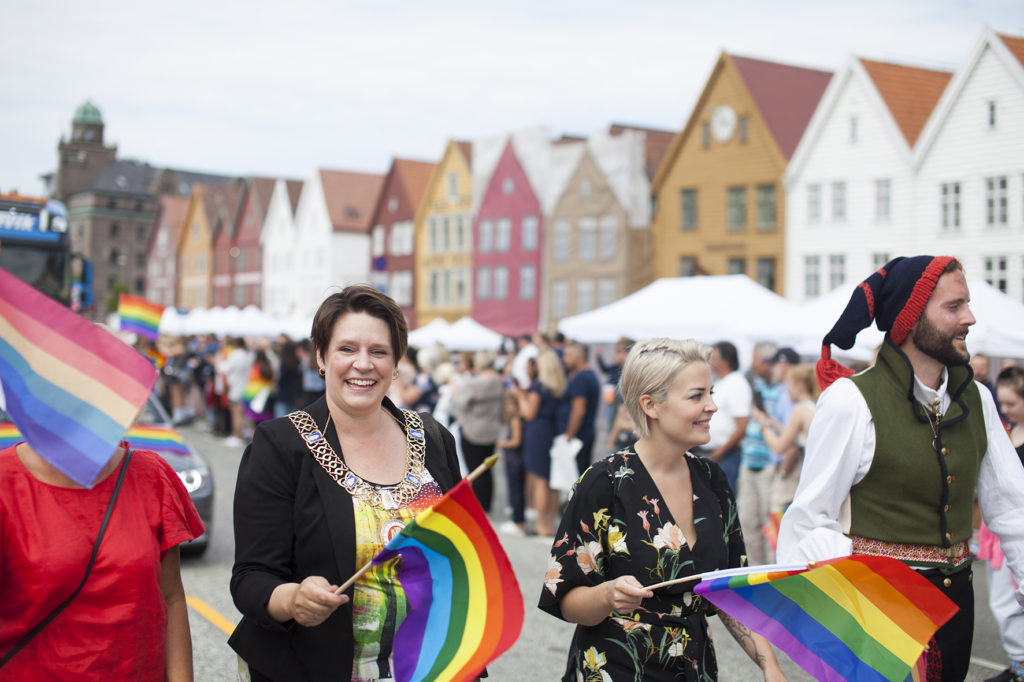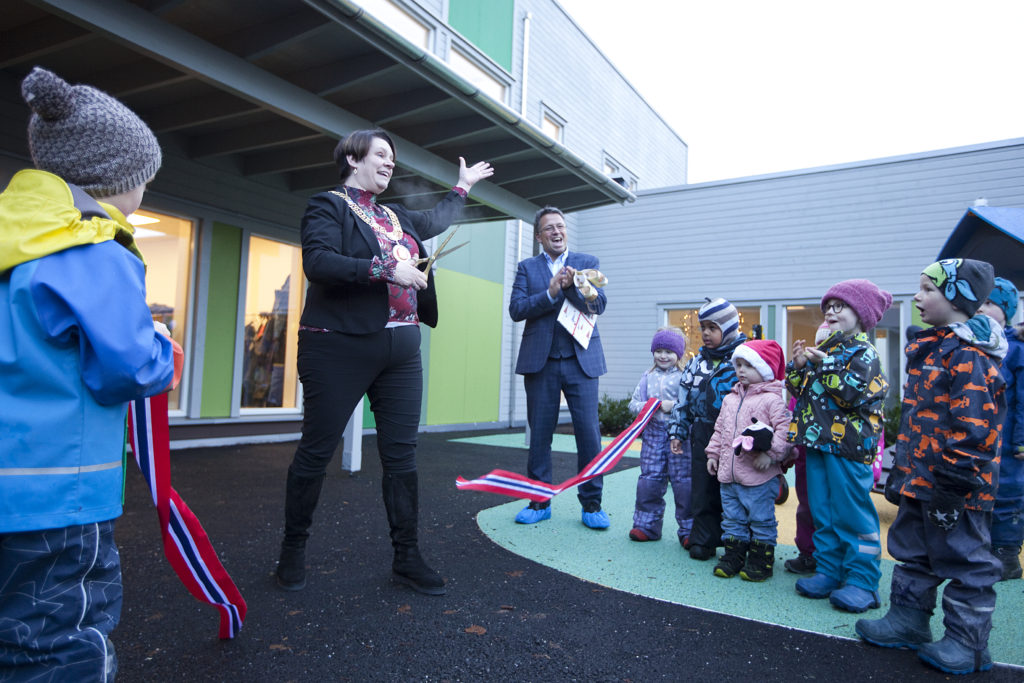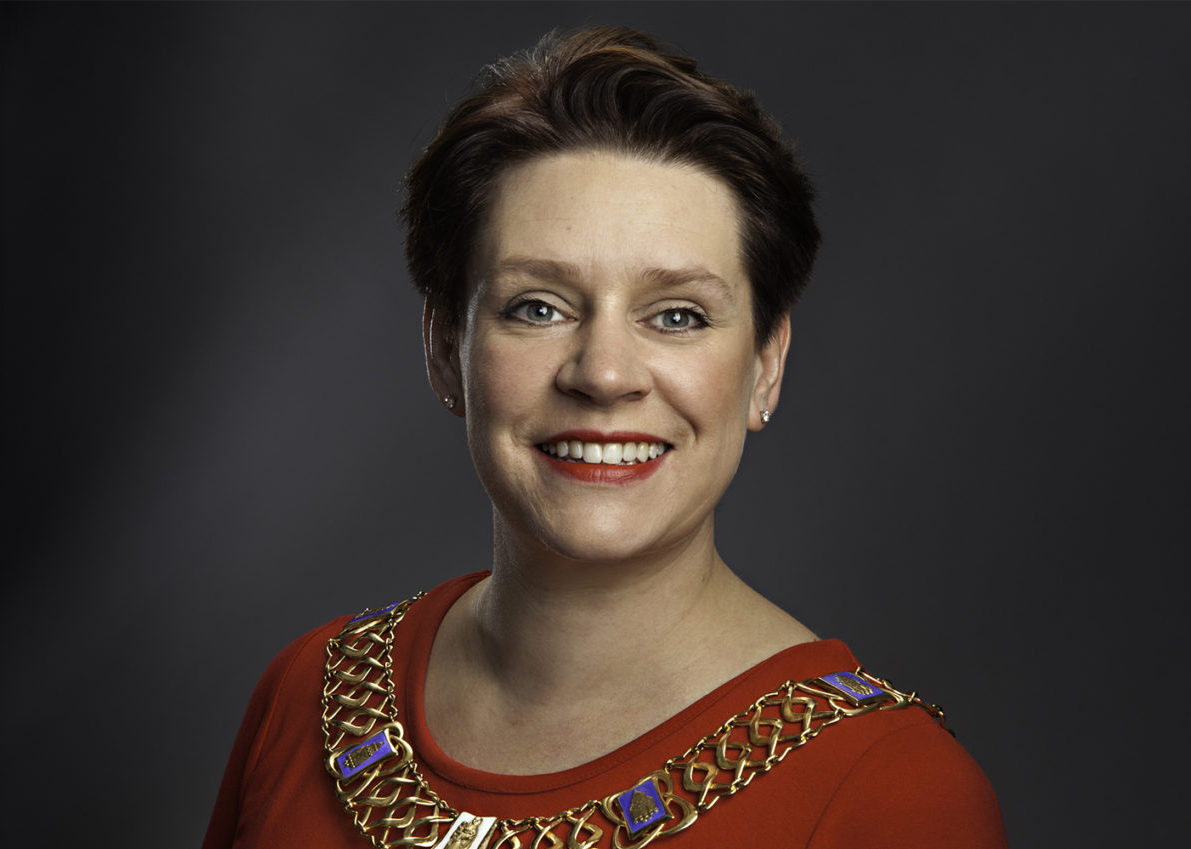“Thinking Globally, Acting Locally”
Mayor Marte Mjøs Persen
Marte Mjøs Persen is the Mayor of the City of Bergen in Norway and has been involved in human rights in one form or another throughout her career. Her special interests include immigration and integration policy, social justice and climate policies, and also cultural policy. At the World Human Rights Cities Forum (WHRCF), Mayor Persen was part of the team that presented on Economic, Social, and Cultural Rights on the first day of the forum. She was kind enough to grant time for the interview with the Gwangju News that follows. — Ed.

Gwangju News (GN): Mayor Persen, thank you for providing time for this interview with the Gwangju News. To begin with, would you tell us a little about yourself and your background?
Mayor Persen: Sure. I have been Mayor of the City of Bergen, Norway, since 2015 representing the Labour Party. I have also been a member of the City Council of Bergen since 2003. During my first term on the City Council, I was a member of the Committee for the Environment and Urban Development. I then moved on to be the deputy chair of the Finance Committee and chaired the Committee on Health and Social Affairs. I am especially interested in immigration and integration policy, social justice, and climate policies, as well as cultural policy.
GN: Please tell us how you became involved in human rights.
Mayor Persen: I have been concerned with issues of human rights for as long as I can remember. Before I became a full-time politician, I worked in a humanist organization dedicated to human rights and other humanist questions.
GN: Can you tell us about your experiences on the City Council of Bergen and the Committee for the Environment and Urban Development and what these committees have been able to accomplish?
Mayor Persen: I think my role as a local politician in quite a small city in a small country is to do what I can to make the city its best for people who are living in it and for people visiting the city. Our contributions can seem small in a global context, but I believe strongly that we need to do our best and that all contributions are important. In our city, we have been able to cut CO2 emissions and air pollution by building a light rail to transport people all over the city, amongst other things. I like to think of myself as thinking globally and acting locally.

GN: You mentioned that you are especially interested in policy regarding immigration and integration, social justice, climate, and cultural. Could you tell us a little about your beliefs and works in any of these areas or in human rights in general?
Mayor Persen: When I first started my life in politics, I was an activist and a student politician. I did it because I wanted to change our society and our political course. A lot has happened since then. Although most advancements have been positive, there are cases around the world where people have fewer rights today than thirty years ago. We see great democracies starting to show cracks and not being able to keep their own population safe. We see far-right movements getting elected into office with a desire to suppress members of their own communities.
I firmly believe that policymakers can make a difference in these matters. As a social democrat, my purpose is to reinforce everyone’s right, no matter who they are, what they believe in, or where they come from. A liberal democracy needs to play on the strength of its diversity. Policymaking is about changing the society one bit at a time to implement structures so nobody is left behind in our society.
GN: We know that Bergen is about to become a human rights city, joining the family of human rights cities around the world. Could you tell us more about the process and your involvement?
Mayor Persen: It is a great honor for our city to achieve the status of a human rights city. Cities play a key role in upholding human rights. Since people live locally, this is the level of government where human rights should unfold.
By becoming a human rights city, we put pressure upon ourselves in order to raise the bar on human rights. This will require the city to always have human rights in mind when developing new services. We must understand how human rights interact with our services, such as health and education, and make sure that everyone gets treated equally. This new status will also help us in becoming even better in integrating immigrants in our city and help us in becoming an inclusive city for all minorities.
As a human rights city, we will also demand actions from our businesses. They will have to show progress in cutting their carbon footprints, so that we can become a carbon-neutral city. Our hope is that the “human rights city” title will inspire inhabitants to do more in the spirit of human rights. We want to send a signal to the world that everyone needs to help out in making the world a better place.

GN: You participated in an intercultural event held at the Council of Europe’s Parliamentary Assembly Summer Session under the themes of “Urban Policies for the Inclusive Integration of Migrants.” Could you please tell us more about Bergen’s role in this session on urban policies?
Mayor Persen: Bergen is a city that increases in size every year. This demands a comprehensive strategy in order for our city to remain clean and fair for everyone. Population growth gives us opportunities that we otherwise would not have, but it does also require us to make smart moves for us to reduce our carbon footprint as well as local pollution. Fighting these different challenges can often lead to increased social inequality. The price of becoming a smarter city must be shared by all inhabitants. People with socioeconomic disadvantages must get better services in the Bergen of tomorrow. If not, we have failed. The most basic and important task is to make sure that all people get paid for their labor.
GN: COVID-19 has completely changed the global landscape, can you speak briefly about promoting human rights in a global pandemic?
Mayor Persen: The global pandemic caused by COVID-19 is at its core a health crisis. However, the impact of this crisis reaches even further. The burden of the pandemic has not been carried out in a fair manner. It is my strong belief that even when handling a major global crisis, we cannot compromise on maintaining acceptable standards of human rights. COVID-19 does not see race or sex, and it does not care about ethnicity, religion, or nationality. Still, we have indications that the virus does greater damage in deprived areas. Ultimately, the crisis increases the need for progressive human rights policies.
GN: In regards to the Gwangju’s World Human Rights Cities Forum, could you tell us how important you consider instilling a culture of human rights at the local – the city – level?
Mayor Persen: Our role as local authorities is more important than ever before. With the great challenges ahead, we cannot solely rely on states and global stakeholders to solve our problems. Whether it is a question of saving the climate or insuring everyone’s human rights, local governments need to take action. Without regional and local governments, there would not be any implementation of the acts of the High Commissioner for Human Rights.
I am worried about the polarization of politics around the world. The current situation, with isolated news sources and echo chambers, does not promote a healthy political debate. As a mayor, my goal is to align different points of view. It is not a matter of everyone agreeing on everything but accepting our differences of opinion. When cities are able to put forward progressive agendas to strengthen our efforts with regards to human rights, I see hope in that our nations will follow.

GN: The Gwangju News shares in your hope. Mayor Persen, we would like to thank you for this interview and for your work in human rights in your city, in Norway, in Europe, and globally through the World Human Rights Cities Forum.
Photographs courtesy of Jin Mæland and Municipality of Bergen.





